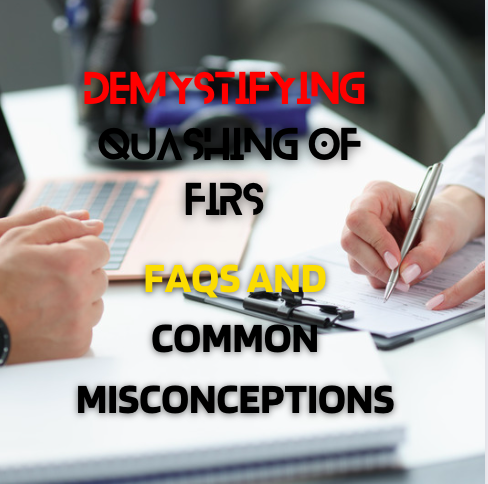In this article we have explained about Quashing of FIRs
Demystifying Quashing of FIRs: FAQs and Common Misconceptions
Filing a First Information Report (FIR) initiates the legal process by reporting an alleged offense to the authorities. However, the quashing of an FIR involves a higher court’s intervention to nullify the report, preventing an unjust or unfair investigation or trial. This process often remains misunderstood. Let’s delve deeper into this topic by addressing frequently asked questions (FAQs) and dispelling common misconceptions.
You can Read : Legal procedure for Quashing of FIR
FAQs (Frequently asked Questions)
- What legal provisions govern the quashing of an FIR? Quashing an FIR is governed under Section 482 of the Code of Criminal Procedure (CrPC) in India, which empowers the High Court to exercise its inherent jurisdiction to ensure justice.
- Can an FIR be quashed without the accused’s presence in court? Generally, the accused or their legal representative needs to be present during court proceedings related to quashing of an FIR unless exempted by the court for specific reasons.
- Are there specific time limitations for filing a petition to quash an FIR? There’s no strict time limitation for filing a petition to quash an FIR, but it should be done at the earliest reasonable opportunity once the grounds for quashing become apparent.
- What happens to the investigation after an FIR is quashed? Upon quashing of an FIR, the investigation related to that particular FIR is halted. However, other FIRs or legal proceedings might continue if unrelated to the quashed FIR.
- Is there a difference between quashing an FIR and staying the proceedings? Quashing an FIR terminates legal proceedings based on it, while staying the proceedings temporarily suspends them until a certain condition or situation is resolved.
- Can an FIR be quashed if the accused is absconding or untraceable? Quashing of an FIR can still be sought, even if the accused is absconding or untraceable, provided there are strong grounds justifying the quashing.
- What role does the public prosecutor play in the quashing of an FIR? The public prosecutor represents the state in court proceedings. Their opinion might be considered by the court, but the decision to quash an FIR rests with the court.
- Can a complaint or FIR be quashed based on personal disputes between parties? Personal disputes alone might not suffice as grounds for quashing an FIR. The court looks for substantive legal reasons justifying the quashing beyond personal disagreements.
Common Misconceptions
- Quashing an FIR implies an admission of guilt by the accused. Quashing an FIR doesn’t imply guilt. It signifies legal intervention due to procedural or substantive flaws or to prevent misuse of the legal system.
- Quashing an FIR guarantees the accused’s innocence. Quashing halts legal proceedings based on that FIR but doesn’t establish the accused’s innocence. It is a legal remedy addressing procedural or substantive issues.
- Quashing an FIR leads to automatic compensation for the accused. Quashing an FIR doesn’t automatically warrant compensation for the accused. Separate legal procedures are required to claim compensation for wrongful prosecution.
- Filing a petition for quashing guarantees its acceptance by the court. Filing a petition doesn’t guarantee acceptance. Courts assess each case meticulously based on merit, evidence, and legal grounds before deciding on quashing.
- Quashing an FIR is only for serious criminal offenses. Quashing can apply to various offenses, including non-serious ones, depending on the grounds and evidence presented justifying its invalidation.
- Quashing an FIR bars subsequent legal action by the complainant. Quashing an FIR doesn’t prevent the complainant from pursuing legal remedies through other means or filing fresh complaints with substantial evidence.
- Quashing an FIR removes all legal repercussions for the accused. While it stops proceedings based on that FIR, it doesn’t eliminate the possibility of future legal actions or investigations based on new evidence or complaints.
- Quashing an FIR is solely at the discretion of the complainant. Quashing is a judicial decision based on legal grounds and merits, not solely at the discretion of the complainant or accused party.
